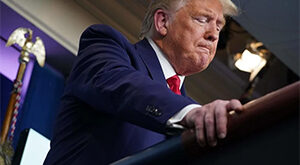A California man has pleaded guilty to inadvertently selling bank accounts to Russians who were indicted Friday by a federal grand jury for interfering in the 2016 U.S. presidential election.
Richard Pinedo pleaded guilty to using stolen identities to set up bank accounts that were then used by the Russians, according to a February 12 court filing.
The special counsel investigating Russian meddling on Friday announced charges against 13 Russian citizens and three Russian entities for interfering in the election.
The indictment alleges that the Internet Research Agency, a St. Petersburg-based social media company with Kremlin ties, 12 of its employees, and its financial backer orchestrated an effort to influence the 2016 election campaign in favor of President Donald Trump.
Prosecutors charged Yevgeniy Prigozhin, a businessman with close ties to Russian President Vladimir Putin, with funding the operation through companies he controls, Concord Management and Consulting LLC, Concord Catering and a number of subsidiaries.
Prigozhin and his businesses allegedly provided “significant funds” for the Internet Research Agency’s operations to disrupt the U.S. election, according to the indictment.
Deputy Attorney General Rod Rosenstein said that the Russian conspirators sought to “promote social discord in the United State and undermine public confidence in democracy.”
“We must not allow them to succeed,” Rosenstein said at a news conference in Washington.
The conspiracy was part of a larger operation code-named Project Lakhta, Rosenstein said.
“Project Lakhta included multiple components – some involving domestic audiences within the Russian Federation and others targeting foreign audiences in multiple countries,” Rosenstein said.
Mueller, who has made no public statements about the Russia investigation since his appointment last May, did not speak at the news conference.
Charges against Russian nationals
The indictment charges all the defendants with conspiracy to defraud the United States. Three defendants are charged with conspiracy to commit wire and bank fraud, and five individuals with aggravated identity theft.
None of the defendants charged in the indictment are in custody, according to a spokesman for the Special Counsel’s office.
The U.S. and Russia don’t have an extradition treaty and it’s unlikely that any of the defendants will stand trial in the U.S.
The 37-page charging document alleges that the Russian conspirators sought to coordinate their effort with Trump campaign associates, but it does not accuse anyone on the Trump campaign of colluding with the Russians.
Trump took to Twitter after the indictment was announced to again deny his campaign worked with the Russians.
“Russia started their anti-U.S. campaign in 2014, long before I announced that I would run for president,” Trump tweeted. “The results of the election were not impacted. The Trump campaign did nothing wrong – no collusion!”
The indictment marks the first time Mueller’s office has brought charges against Russians and Russian entities for meddling in the 2016 election.
Mueller’s sprawling investigation has led to the indictments of former Trump campaign chairman Paul Manafort and associate Rick Gates.Former Trump National Security Advisor Michael Flynn and former campaign foreign policy adviser George Papadopoulos have pleaded guilty to lying to the FBI about their contacts with Russian officials.
Details of indictment
The indictment says the Russian campaign to “interfere in the U.S. political system” started as early as 2014 and accelerated as the 2016 election campaign got underway.
During the 2016 campaign, the Russian operatives posted “derogatory information” about a number of presidential candidates. But by early to mid-2016, the operation included “supporting” Trump’s presidential campaign and “disparaging” Democratic candidate Hillary Clinton.
Taking on fake American identities, the Russian operatives communicated with “unwitting” Trump campaign associates and with other political activists “to seek to coordinate political activities,” the indictment says.
The indictment describes how Russian operatives used subterfuge, stolen identities and other methods to stage political rallies, buy ads on social media platforms, and pay gullible Americans to “promote or disparage candidates.”
To avoid detection by U.S. law enforcement agencies, the Russian operatives used computer networks based in the United States, according to the indictment.
“These groups and pages, which addressed the divisive U.S. political and social issues, falsely claimed to be controlled by U.S. activists when, in fact, they were controlled by defendants,” the indictment reads.
A number of the operatives are alleged to have traveled to the United States under “false pretenses to collect intelligence to inform the influence operations.”

 South Asian Gazette Worldwide News Work
South Asian Gazette Worldwide News Work



